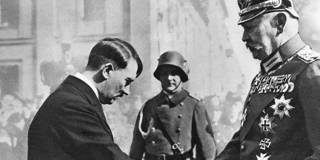Adolf Hitler’s rise to power in 1933 remains all too relevant today. Much of the world will vote in pivotal elections this year, and even though the warning signs are there, too few commentators, politicians, and business leaders openly acknowledge that liberal democracy itself is on the ballot.
DUBLIN – On January 30, 1933, Adolf Hitler was appointed chancellor of Germany. To his supporters, it was a day of “national revolution” and rebirth. Germany, they believed, needed the restorative force of an authoritarian strongman after 14 years of the liberal-democratic Weimar “system.” That night, Hitler’s torch-bearing brownshirts marched through central Berlin to mark the dawn of a new era.

DUBLIN – On January 30, 1933, Adolf Hitler was appointed chancellor of Germany. To his supporters, it was a day of “national revolution” and rebirth. Germany, they believed, needed the restorative force of an authoritarian strongman after 14 years of the liberal-democratic Weimar “system.” That night, Hitler’s torch-bearing brownshirts marched through central Berlin to mark the dawn of a new era.